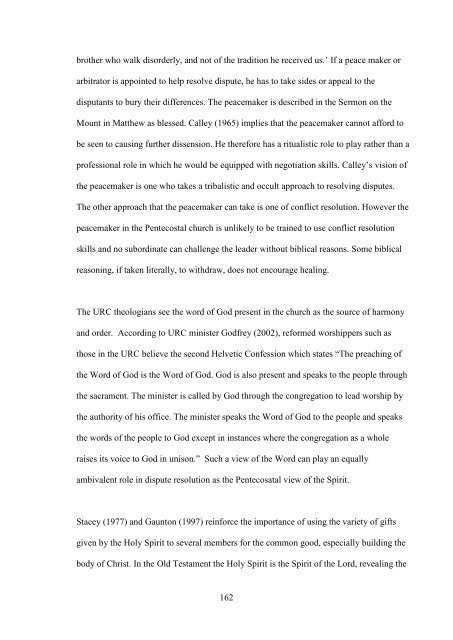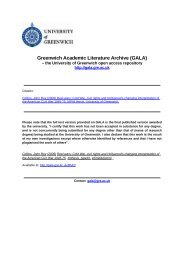- Page 1:
Greenwich Academic Literature Archi
- Page 4 and 5:
AcknowledgementsI extend much grati
- Page 6 and 7:
Chapter 3: Methodology 633.1 Introd
- Page 8 and 9:
7.3 Prayer as Health Seeking Behavi
- Page 10 and 11:
CHAPTER ONEINTRODUCTION AND CONTEXT
- Page 12 and 13:
healing, bricolage and the use of s
- Page 14 and 15:
To remedy these gaps in the discour
- Page 16 and 17:
do with me‟ so she sent me to sch
- Page 18 and 19:
Interestingly, after 30 years of pr
- Page 20 and 21:
listening to a group of people that
- Page 22 and 23:
that I felt within the Black majori
- Page 24:
Chapter 3 describes the methodology
- Page 27:
espondents‟ perception of sufferi
- Page 30 and 31:
CHAPTER TWOLITERATURE REVIEW2.1 Int
- Page 32 and 33:
themes, it became necessary to revi
- Page 34 and 35:
suggests a combined approach where
- Page 36 and 37:
and healing as a kind of self-impro
- Page 39 and 40:
eports that the English believed th
- Page 41 and 42:
According to Davey et al (2002) ill
- Page 43 and 44:
deviant behaviour. The difference b
- Page 45 and 46:
church concretised the ideas of rel
- Page 47 and 48:
theology. It is no accident that th
- Page 49 and 50:
concept of culture we inevitably do
- Page 51 and 52:
When we look at the effect of cultu
- Page 53 and 54:
to help us to understand the totali
- Page 55 and 56:
information about the association a
- Page 57 and 58:
when emotional wounds are healed or
- Page 59 and 60:
climatic conditions, shelter and a
- Page 61 and 62:
cancers has been documented by Phil
- Page 63 and 64:
concepts of reality and destiny are
- Page 65 and 66:
healer intentionally through a proc
- Page 67 and 68:
attachments that meet humans' funda
- Page 69 and 70:
distinguish from mental disorders.
- Page 71 and 72:
take a phenomenological and ethnogr
- Page 73 and 74:
coming but her method is not primar
- Page 75 and 76:
from posters on the church notice b
- Page 77 and 78:
Healing services in both churches f
- Page 79 and 80:
Qualitative method can, however, be
- Page 81 and 82:
3.5 Problems of participant and non
- Page 83 and 84:
difficulties that were to be presen
- Page 85 and 86:
isolating experience was certainly
- Page 87 and 88:
not necessarily addressed through t
- Page 89 and 90:
It may not be possible for all the
- Page 91 and 92:
signed to their awareness and appro
- Page 93 and 94:
Consequently the practice relating
- Page 95 and 96:
problem free. Ethnography requires
- Page 97 and 98:
ecommended by the Pastor. When they
- Page 99 and 100:
The greater proportion of females i
- Page 101 and 102:
difficulties involved in constructi
- Page 103 and 104:
musical Pentecostal style of worshi
- Page 105 and 106:
The different emphases in soteriolo
- Page 107 and 108:
literature may remain in its infanc
- Page 109 and 110:
does not mean „Pentecostal‟ nor
- Page 111 and 112:
church, the cultural differences we
- Page 113 and 114:
umbrella of churches. The leaders c
- Page 115 and 116:
local autonomy, the majority of Con
- Page 117 and 118:
The post-1905 Pentecostals saw thei
- Page 119 and 120: the Holy Ghost). Interestingly the
- Page 121 and 122: the churches they are busy breaking
- Page 123 and 124: friends started to meet in the home
- Page 125 and 126: such as COGIC, have developed a str
- Page 127 and 128: the church group to strangers. In t
- Page 129 and 130: and illustrate the oral tradition o
- Page 131 and 132: 4.8.1. Description of the inside of
- Page 133 and 134: The order of service below is based
- Page 135 and 136: forgiving note may signify partial
- Page 137 and 138: Table 3 Organisational hierarchy of
- Page 139 and 140: One of the original churches which
- Page 141 and 142: communion table. To the right of th
- Page 143 and 144: Minister used an acronym to illustr
- Page 145 and 146: GloriaPrayer for grace or collectSc
- Page 147 and 148: service whilst URC church attendees
- Page 149 and 150: mainstream Christianity, their doct
- Page 151 and 152: on the project and make requests to
- Page 153 and 154: made to integrate the white people
- Page 155 and 156: ‗Garlic is good for reducing high
- Page 157 and 158: 4.13 ConclusionThis chapter began w
- Page 159 and 160: organization. This role can only be
- Page 161 and 162: 5.3 The Authority and Power of the
- Page 163 and 164: to become approved (professional) m
- Page 165 and 166: majority. In recent years with Brit
- Page 167 and 168: leadership although it is about aut
- Page 169: Azusa Street outpouring in 1906. Af
- Page 173 and 174: Although the Holy Spirit was presen
- Page 175 and 176: Respondent 3 covered topics includi
- Page 177 and 178: Respondent 10 (below) has similar v
- Page 179 and 180: of rejection by the host community
- Page 181 and 182: ehaviour model. In this situation,
- Page 183 and 184: and they feel. It is not everybody
- Page 185 and 186: many sections of society. It also s
- Page 187 and 188: people. These qualities, however, a
- Page 189 and 190: came across as though he was presen
- Page 191 and 192: very important for this.On occasion
- Page 193 and 194: CHAPTER SIXSUFFERING AND HEALING6.1
- Page 195 and 196: mind body and spirit implies that i
- Page 197 and 198: suffering. Most of these situations
- Page 199 and 200: Respondent: Not for my sister she h
- Page 201 and 202: man to repent and return to the cre
- Page 203 and 204: clotting treatment. After the treat
- Page 205 and 206: gift of miraculous powers go with t
- Page 207 and 208: What I teach on this matter is, tha
- Page 209 and 210: The bible does not condemn, forbid
- Page 211 and 212: possibility of impending change in
- Page 213 and 214: prayer or they are rested. What is
- Page 215 and 216: „Whatever the educational attainm
- Page 217 and 218: „The message of Job is a comfort
- Page 219 and 220: he has questioned God‟s purposes
- Page 221 and 222:
pray for them. In the words of seve
- Page 223 and 224:
demonic forces. Explanations of spi
- Page 225 and 226:
In the observation example quoted a
- Page 227 and 228:
employed by the mother had she live
- Page 229 and 230:
healing. Worthington et al. (2007)
- Page 231 and 232:
in the account of a young mother in
- Page 233 and 234:
y not having a normal relationship
- Page 235 and 236:
and not related to any one cultural
- Page 237 and 238:
prayer to ma e me better‟, as tho
- Page 239 and 240:
Non-academic, or „popular‟ Chri
- Page 241 and 242:
when the healer petitions God in pr
- Page 243 and 244:
health and the ways in which hospit
- Page 245 and 246:
showing lethargy in praying, failin
- Page 247 and 248:
know when you have stomach ulcer yo
- Page 249 and 250:
ministers like Harris (2002) 3 . Th
- Page 251 and 252:
Healing services in the URC are mor
- Page 253 and 254:
Respondent: You have to have the gi
- Page 255 and 256:
psychological effect of knowing her
- Page 257 and 258:
Chapter 2, without taking some posi
- Page 259 and 260:
Prayer for distant healing takes pl
- Page 261 and 262:
Although prayers for healing are sa
- Page 263 and 264:
The healing services also include f
- Page 265 and 266:
The method and processes of closing
- Page 267 and 268:
7.7. ConclusionThis chapter has exa
- Page 269 and 270:
This chapter was born out of observ
- Page 271 and 272:
website (http://www.stonybrookmedic
- Page 273 and 274:
For those who reject traditional Ch
- Page 275 and 276:
hands on the forehead of each perso
- Page 277 and 278:
The minister also invited the rest
- Page 279 and 280:
service closed with silence accompa
- Page 281 and 282:
In this respondent‟s‟ account,
- Page 283 and 284:
Below are brief parts of extracts p
- Page 285 and 286:
service was when the speaker came t
- Page 287 and 288:
observed believed the aura of the h
- Page 289 and 290:
Ministers/healers of these two cong
- Page 291 and 292:
constituent of worship even where t
- Page 293 and 294:
to herself, and argues that music h
- Page 295 and 296:
could not read or write. Such music
- Page 297 and 298:
linking the psychic/mythological an
- Page 299 and 300:
group coordination through rhythmo-
- Page 301 and 302:
People can become so involved in a
- Page 303 and 304:
visual and auditory areas which act
- Page 305 and 306:
Campbell (1998) argue that as music
- Page 307 and 308:
The extracts from fieldwork notes b
- Page 309 and 310:
In COGIC the singing is accompanied
- Page 311 and 312:
when I was ill. Then my mum died th
- Page 313 and 314:
The passage cited from Respondent 1
- Page 315 and 316:
CHAPTER TENCONCLUSION AND RECOMMEND
- Page 317 and 318:
etween health professionals and chu
- Page 319 and 320:
The initial aim of the study: „to
- Page 321 and 322:
part of worship services a priority
- Page 323 and 324:
health professionals and spiritual
- Page 325 and 326:
are culturally conditioned rational
- Page 327 and 328:
professionals. Despite the differen
- Page 329 and 330:
prominent amongst people who attend
- Page 331 and 332:
ReferencesAchterberg, J., (1985) Im
- Page 333 and 334:
Bentham, J., (2001ff, originally 18
- Page 335 and 336:
Department of Health, (1999) Saving
- Page 337 and 338:
Hall, S., (1985) “Religious Ideol
- Page 339 and 340:
Katz, J. J., (1990) Metaphysics of
- Page 341 and 342:
http://emedicine.medscape.com/artic
- Page 343 and 344:
Pullar, P., (1988) Spiritual and La
- Page 345 and 346:
Comparative Perspective, Berg, Oxfo
- Page 347 and 348:
International, London and New York.
















